He whakaaro | Message from Professor Stephen Robertson FRSNZ Domain Convenor – Health & Medical Sciences

Tēnā koutou
Having now been immersed in science for over 40 years, and particularly in these current times where scientific endeavour seems to be less valued in some influential corners, I occasionally find myself pondering the more youthful me and what motivated him to embark on this career path. These thoughts don’t bubble up from any source of despondency or disillusionment. Quite the opposite. They revisit a wellspring of curiosity that was at first quite ill-focused but still generated a sense of excitement and wonder. What tamed it, directed it and moulded it were forces and people that I seemed to chance across; incidents or personages delivering moments of what proved to be extraordinary good fortune. These days I get a glimpse of it when teaching, most often in labs, when students will genuinely express wonder, fascination and, yes, even “coolness” in what they were learning. Those sparks of curiosity and wonder are still very much prevalent amongst youth. An important question to myself is what do I do to kindle those sparks. Am I paying my good fortune forward?
These are tough times for science in New Zealand. I don’t need to list their sources and events that are feeding them from local, national and global directions. They will be all only too familiar. Here in Aotearoa we are particularly vulnerable and their effects have been felt already by colleagues and friends – often in very confronting ways. The Society’s Academy Executive Committee has recently convened an Advisory Group to keep an explicit watching brief for Threats to Science. It was heartening to see so many step forward to participate. The Group is being co-chaired by Professors Neil Boister FRSNZ and Nancy November FRSNZ and work is currently underway. It is hoped that this body can be a focused and watchful mechanism by which scientific endeavour can be protected and nurtured and the emergent threats identified or pre-empted.
In acknowledging the reality that this world now requires such viligance, it is also important that we scientists maintain our positivity, enthusiasm and commitment to science. While still being proponents for vigilance around threats to science, we also must be acolytes for how much true progress in this modern-day world depends on it. Moreover, that literacy, if not a career, in science is a valid, important, stimulating and exciting choice for life. It strikes me that compared to the length of careers that our current students will pursue, our current challenges, while significant, will prove to be transient. Our demeanour, our unstinting curiosity and sense of wonder are potent influences to launch the next wave of clever, committed and inspired scientists. Our youth are watching and needing their own moments of extraordinary good fortune.
Ngā mihi
Steven Robertson
